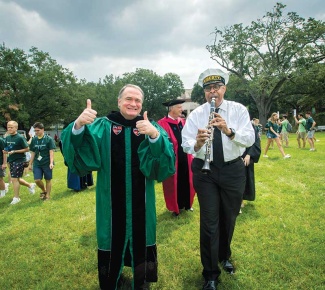I suppose that’s a funny question for many of you who can trace your family’s Crescent City roots back for generations.
For me, I know it wasn’t the first time I ordered my sandwich “dressed” or when I caught my first Muses shoe (I’m still working on a Zulu coconut). It wasn’t when I attended my first Jazz Fest or thought, “It feels a little cooler today,” when the thermometer had dipped down to 85 degrees (in October!). These may have been steps on my journey to becoming a New Orleanian, but they were not the final destination.
My New Orleans Moment
When did you first know you were a New Orleanian?
When did you first know you were a New Orleanian?
Our music, our food, our culture, our language and every sweet New Orleans idiosyncrasy is rooted in the city’s location.
No, I think I became a New Orleanian when I realized how much place matters here. You often hear people refer to an “Only in New Orleans moment” when describing something so unique, magical, charming, crazy or audacious that it could only take place in or near area code 504.
Our music, our food, our culture, our language and every sweet New Orleans idiosyncrasy is rooted in the city’s location. It was this location, ideally situated for trade and defense, that made New Orleans the capital of French Louisiana. It was also this location that bred annual yellow fever epidemics that devastated the local population and prompted a group of young physicians to establish the Medical College of Louisiana—what would later become Tulane University.

Our location continues to present vast advantages (we were recently ranked America’s No. 1 college city and one of the top locations for startups) as well as challenges that power Tulane research and discovery. From infectious diseases to environmental threats to health disparities, to the challenges facing K–12 education, New Orleans is a fertile crescent for ideas, innovations and breakthroughs. And, of course, New Orleans is a muse for writers, musicians, artists, thinkers and seekers of all kinds.
New Orleans also attracts a certain type of student—innovative, creative, daring, bold and willing, on average, to travel more than 900 miles from their hometown to join what is the most national, most eclectic student body in the country. These students seek authenticity and the deep human connections for which New Orleans is famous.
Here they encounter a curriculum defined by place, too, and join a faculty who are as audacious as themselves—more willing to take new approaches and untried paths than those who inhabit more traditional places of learning. At many universities, knowledge is compartmentalized in silos of expertise unavailable to scholars from other fields. In our open, collaborative, unfettered, unsiloed city and university we address issues of local concern that also provide solutions to world problems.
There may be only one Mr. Okra or Dr. John or St. Charles streetcar line, but it turns out that many “Only in New Orleans moments” happen daily on the world’s stage. Our location in one of history’s most culturally significant and environmentally challenging regions means we can make a difference in the lives of people around the world—no matter “where y’at.”






























































